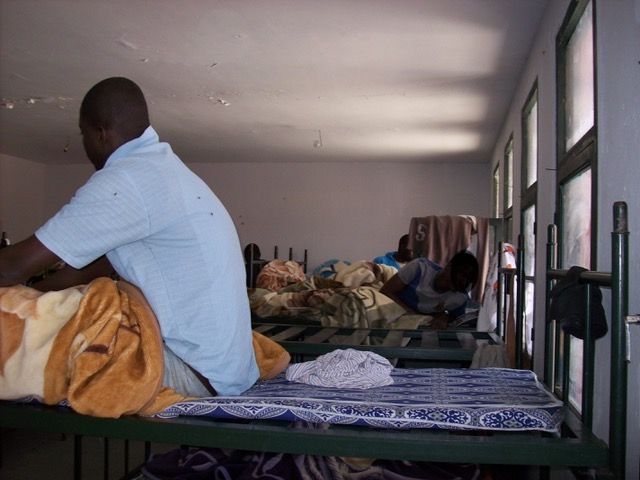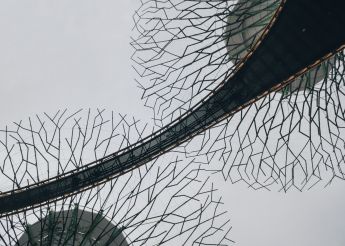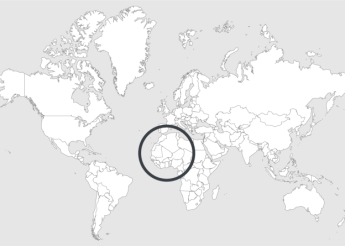Timothy has told part of his story to other journalists. His account of his arrest gives us an idea of the mechanisms at work: “A policeman looked at me and said, ‘Ok, we’re going to take you far away from here!’ I told them that I wasn’t going anywhere with them because they had no grounds. Then, they handcuffed me, with my hands behind my back, and shoved me into the back of a police van”. Rabat is teeming with these vehicles: white vans with red and green inscriptions (the colours of Morocco) and the words “National Security” on the doors.
Timothy was arrested on the street, while others are captured in the Moroccan forests close to the European border, or at their homes during large-scale raids. “Collective arrests in some working-class neighbourhoods of major Moroccan cities are carried out in areas identified as having a high concentration of people presumed to belong to the target group. (…) The police are able to blend into the neighbourhood to obtain information which helps them break into houses where foreigners or ‘Africans’ are likely to be staying illegally. This limits their margin of error in areas where the foreigner is often quickly identified”, says Nadia Khrouz, a member of Morocco’s National Human Rights Council (Conseil national des droits de l’homme, CNDH) in her book The Foreigner in Morocco.
“Some arrests are clearly based on the assumption that a black foreigner would be more likely to be staying illegally. Document checks are not always carried out on site. There have even been people working for international organisations who have been arrested,” says Yassine, a member of an important Moroccan institution.
“The police have always explained to us that, on the street, during raids, they do not have the equipment to check documents”
Philip S. heads the Moroccan office of a large charitable organisation in a big house shaded by vegetation. He is not very chatty: “All I can tell you is that people are under pressure. Some of our employees, even with a residence permit, have been arrested. They have been taken to police stations where they were able to phone us to let us know about their arrest”. On the reports, the police cite “flagrant crimes”. Philip S. adds: “They have always explained to us that on the street, during raids, they do not have the equipment to check documents. So, they do it once they have picked them up and brought them to the police station. The people whose papers are in order are automatically released”.
In 2014 and on the initiative of King Mohammed VI, a wave of regularisations took place. 27,000 people staying illegally applied for a one-year residence permit. 16,000 of them obtained it. According to Philip S., today, Morocco is a country where you must find your place. He thinks that those who wish to settle are welcomed. Those who plan to travel to Europe are subjected to repression and detention. “Morocco is not only a transit country, but increasingly a destination country. Obviously, most people who arrive here plan to go to Europe at some point. Migration is always dynamic. Currently, we have a few more arrivals because the central road to Italy is almost closed. This influences public policies, but the figures are not dramatic”, he explains. Morocco reported There were 98,600 migrants in mid-2019: 0.3% of the population.
Forced relocation by bus¶
Investigating migration in north-eastern Morocco is not without risks: in 2015, a European observer from Amnesty International was escorted to the airport to be deported. “In the morning, we had a meeting with the Morocco’s National Human Rights Council (Conseil national des droits de l’homme, CNDH). Everything went well. In the evening, she left for Oujda to finish her work. It was there that she was apprehended”, says Salah Abdellaoui, the director of the NGO in Morocco. The practices of the country’s police officers include pushing back and forcibly relocating migrants to the south or to the Algerian border, especially from Nador and its surroundings to Oujda, a city located 20 km from Algeria.
The arrested migrants are forcibly moved to a town a little further south. Arrested in Tangier? You will be deported to Rabat. If you are arrested in Rabat, you can finish your journey in Tiznit, Beni Mellal, or even in Marrakech or near Western Sahara. Elsa Tyszler, a researcher at the Centre of Sociological and Political Research of Paris (Centre de recherches sociologiques et politiques de Paris, CRESPPA) and a member of the Migreurop network,has no qualms about defining these forced relocations as another form of deprivation of liberty. She says, “We can say that this is a form of confinement since people are sometimes relocated to very distant locations. It can take several hours before they are fed or have access to running water or a toilet”.
While the immigrants are arrested and placed in National Security vans, other vehicles are used to relocate them. “These are normal buses with a logo on them. I don’t know who they belong to”, says Timothy. These are CTM buses, Morocco’s public transport company. On its website, the company prides itself of its bus rental services for field trips and school events, as well as company outings. “Private companies are paid by the police, the authorities and auxiliary forces. These are not Royal Moroccan Gendarmerie buses. These vehicles go unnoticed and it’s more discreet if they don’t leave a trace”, says Salah Abdellaoui. These buses, which usually serve Moroccan citizens, are made available for the forced relocation of migrants. “The concentration of migrants in some cities is too dense, so we bring them to the south. This was before the Marrakesh Pact . Since then, there have been more deportations to the country of origin with the collaboration of the embassies”, explains Philip S.
The goal: to lead them out and keep them away from the crossing points. Some people describe it as deportation.








